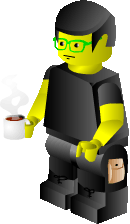identity facets

projects
recommending
reviewing
events
Subscribe...
Posts
WAAA2007 Final Group Discussions and Summaries
- created
- 8/31 11:59 PM
- content
tags:
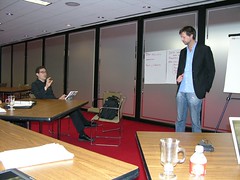 During the last portion of Sunday's WAAA2007 schedule we split up into groups again, but this time more focused along lines of expertise. The technology experts convened separately, and led by Dick Hardt, we brainstormed about what we needed to find out in order to start building, and what could we think of building off the tops of our heads to help with the stated goals and use cases.
During the last portion of Sunday's WAAA2007 schedule we split up into groups again, but this time more focused along lines of expertise. The technology experts convened separately, and led by Dick Hardt, we brainstormed about what we needed to find out in order to start building, and what could we think of building off the tops of our heads to help with the stated goals and use cases.
In addition to the previously mentioned techniques for open and reliable publishing, we also discussed the following important capabilities:
- Continuous acquisition of the "raw data" - regarding whatever it is that we are trying to make more transparent, or illuminate better as it were. The data needs to be continuously published, and not just available as one-off database dumps at some irregular interval.
- Annotation. While granular permalinks greatly assist the task of granular commentary and annotation, there needs to be some way to annotate not just every page, section, and paragraph, but potentially every line or word.
- Reporting & Presentations. One of the problems that immediately becomes apparent in such open publication systems is that of information/data/discussion overload. We need tools, techniques etc. of reporting summaries of the data, discussions, and presenting such summaries or aggregate views so that people in general can get an idea of what things are mostly like without having to do the individual research themselves.
- Good data models and data interfaces. In order to aid all the above, the more that consistent straightforward data models are used in the publication of such information (and aggregates/reports thereof), the easier it will be for more tools to be built that handle the same data across different topics, and different periods of time.
- Persistent identity and reputation. Systems for annotation and commenting should do their best to provide persistent/consistent interfaces for identity (such as using OpenID) and shared reputation. The more that individuals using such systems are able create and build their identities and reputation across systems, the more care they'll take with the input they provide. It would be good if individuals could identify their affiliations with organizations and/or as a constituent. Clearly hCard user profiles enable organizational affiliation, but some form of group membership relationship might help too.
- Moderation. On any particular system for commenting and annotation, it may be helpful to have a moderation system, perhaps based upon the aforementioned identity and reputation systems to aid in filtering and dispute resolutions.
- Polling. It may be possible to aggregate commentary and annotations among / from a group by providing a polling interface to summarize opinions. Such aggregate polls could be useful to policy makers looking for opinion summaries.
- One system vs. enabling systems across the Web. One of the impressions that I got going into the workshop was that there was a tacit assumption among the goals that we were there to help build a specific centralized system for commenting and annotations (people often made statements like "The system should do such and such" or "The site should work this way"). In my experience it's much more important to make sure that the data that such a system would depend on, and that users might enter into such a system, be available in an open format on the Web, so that numerous such systems could be built, perhaps by some of the folks in this workshop, and perhaps by people that none of us have ever met or heard of. As such, I tried very much to stress that such enablement of systems was much more important than building one particular system. Others had the opinion that we should build one specific system, to which my response was, go for it, just make sure that all the external data that the system depends on, and the data that any users would contribute to it, would be available in open formats so that multiple such systems would be enabled, even if we were to start with one "prototype" or "demo" system. It was clear that there wasn't a consensus on this topic so we recorded this as a "vs" point and reported it as such to the workshop participants as a whole.
- Conversion of existing data. Finally, we acknowledged that there is a lot of existing data that is both available, and continuously being made available, that is in legacy formats or perhaps not being placed directly on the Web. There are probably some easy wins to be had by putting in place automatic conversion / translation of such data into open formats and reliable locations on the public Web, as described by the aforementioned requirements for open data publication.
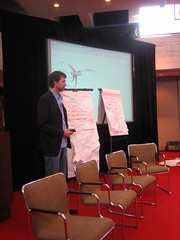 As our group lead, Dick Hardt provided the summaries of the above points which we had recorded both on the wiki as part of the Sunday Group Notes, and on paper sheets which you can see in the photo provided.
As our group lead, Dick Hardt provided the summaries of the above points which we had recorded both on the wiki as part of the Sunday Group Notes, and on paper sheets which you can see in the photo provided.
Closing Lunch And Next Steps
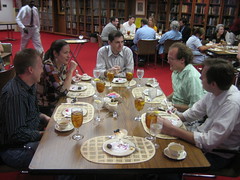 The workshop closed with lunch and informal discussions / reflections, which was a very pleasant way to end a conference, and unique - I don't remember any other conferences offhand which ended with a meal. Perhaps the effect was purely psychological, but somehow ending with a sharing of food and conversation felt particularly bonding and unifying.
The workshop closed with lunch and informal discussions / reflections, which was a very pleasant way to end a conference, and unique - I don't remember any other conferences offhand which ended with a meal. Perhaps the effect was purely psychological, but somehow ending with a sharing of food and conversation felt particularly bonding and unifying.At the end of the workshop we took a short video where nearly everyone (or perhaps everyone, I couldn't quite see everyone myself) raised their hands in affirmation of a commitment to help continue the efforts and work we started during the workshop. I'm sure that each of us will play a different role and provide respective contributions in our areas of expertise.
You can see for yourself on the wiki that substantial work has happened (and continues) since the workshop.
As it was made clear to me that clarifying and promoting recipes for open and reliable publishing is key to many of the stated goals, that's the area that I've decided to focus on.
In particular, aspects of online social networking were mentioned throughout the workshop, and as soon as the weekend after, fellow workshop participants Joseph Smarr, Brad Fitzpatrick and I attended BarCampBlock and led several related sessions: microformats community meetup, opening the social graph, and social network portability today.
Thus my contributions to the goals of the workshop will likely come from my focus on developing and advancing microformats for both social network portability, and for data formats that commenting/discussion systems require, such as hCard for people and organizations, hCalendar for events, hReview for commentary/reviews, hAtom for syndicating episodic information, and a citation microformat for easier publication and discovery of references for discussion purposes.
For further reading see more posts on the "We Are All Actors" workshop:
- View blog reactions
Open discussions require open and reliable publishing
- created
- 8/31 11:56 PM
- content
tags:
While I certainly applaud the various goals discussed during the WAAA2007 workshop, I couldn't help but think that smaller steps are first required to at least move us in the direction of the longer term goals.
Open discussions about the Federal budget, or anything government related, requires first of all, open and reliable publication of the information that is to be discussed.
Open and reliable can mean many things in this context, so those of us who were more technically inclined pointed out the following key steps that anyone can take towards open and reliable publishing in today's world:
- Publish HTML (preferably valid and accessible POSH), not proprietary document formats like MS Word .docs or PDFs (PDFs, as automatically generated by today's applications, are unreliable anyway).
- Publish on the public Web.
- Publish at permanent URLs that do not change.
- Preferably publish at URLs 70 characters or shorter, such references are more robust.
- Markup each heading and paragraph with unique local fragment identifiers.
If every government site had to publish all their documents as above, that would go a long way towards providing a foundation for open discussions.
HTML is readily repurposable with all the parsers and tools out there (as compared to proprietary formats).
Publishing on the public web with URLs that don't change means bloggers, forum users etc. can then link to what they are specifically discussing. Link aggregation search engines like Technorati or Google Blog Search can tell you who is talking about what.
Publishing at URLs 70 characters or less helps the reliable transmissability of those pointers to your pages thru various media like email etc.
Finally, given the length of many documents published by governments, marking up each section, heading, and even paragraph with a unique
idattribute enables people to link to a specific section or paragraph that they want to comment on.Once you have that foundation of open and reliably published data, you enable both anyone on the Web to comment on them immediately using existing blogging tools, but more importantly, you enable the creation of a new generation of perhaps government-specific (or even budget specific) discussing tools (e.g. www.govtrack.us) which can simply use permalinks to official resources as the targets of their discussions.
- View blog reactions
Inverting Assumptions
- created
- 8/31 11:54 PM
- content
tags:
Years of formal professional experience with developing data formats (from when I started on OpenDoc at Apple in 1992, to working on XHTML2 in the W3C) taught me a lot about what worked and what didn't. By analyzing my personal experiences and data format efforts out there in the wild I discovered a number of commonly shared implicit assumptions. With additional analysis I was able to determine which of these assumptions led to failures, or very slow adoption, or perhaps simply unnecessary friction on an otherwise good idea. From the beginning of when I first coined the word "microformats" and introduced it at O'Reilly's ETech conference in 2004 with Kevin Marks, I openly not only questioned numerous assumptions, but stated their inverses as design principles.
In my conversation on the van ride over on the second day of the WAAA2007 workshop, I told the gentleman from the New York Times that the core ideas behind microformats were about inverting several conventional assumptions, and proceeded to list the ones that came to mind:
- Solve small specific problems rather than big problems. There are lots of simple problems to solve on the Web. By focusing on those rather than the big hard problems we get more done, and we learn important lessons (and perhaps even create a few building blocks) that make solving the harder problems easier. Since solving simpler problems first is more productive than solving hard problems first, why do people solve hard problems first? Perhaps one or more of the following: ego, peacocking, boredom, disinterest.
- Research existing data publishing behaviors and data formats, and then base designs directly on that research, rather than inventing new technologies for new spaces. When presented with the question of how to exchange information between two websites, or an API etc., most web developers (and even open source developers) today seem to jump to inventing their own XML format and optimizing it for the specific purpose they need. Few such problems are actually novel however, and thus it is much better to first assume that someone else has solved the problem and look for such format solutions to reuse, repurpose, or at least use as the basis of a design.
- Re-use existing vocabularies where possible, rather than inventing your own vocabulary/language (in contrast to XML culture).
- Provide a solution to marking up data in existing web pages, rather than asking publishers to create machine-only side files in a new format. Most web developers (not designers, but back end developers typically) that I speak to seem to be strongly biased towards creating "side files" with the "raw data" when asked to provide "machine readable" information. Inverting this principle is actually an instance of following a few other principles, namely, Don't Repeat Yourself (DRY), and visible data is more reliable than invisible data.
- Solutions accessible to millions of hypertext web authors are better than solutions just for programmers. This seems obvious to any web designer, and yet, how often do you hear people calling for some random XML format to solve some problem? Or "open APIs" as if they will solve all problems? If you're a programmer and you spend most of your time talking with and working with other programmers, then just using XML and open APIs seems perfectly fine. However, there are perhaps 1000x more hypertext authors than programmers, and thus purely by the numbers, the adoption of solutions accessible and understandable by hypertext authors will clearly outpace those that require programming skills such as XML and open APIs.
- View blog reactions
Demonstrate technology efficiency with real-time practice
- created
- 8/31 11:52 PM
- content
tags:
Most folks at the WAAA2007 conference were users, that is, they knew the basics of using computers, the Web etc., but you couldn't necessarily assume they knew how to edit a wiki (though pretty much everyone had heard of Wikipedia). To the average user, technology is a complex black box that seems to work most of the time. There is also a perception that doing technical things is a lot of work and takes a lot of time.
One of the earliest questions I asked the first day (shortly after Silona announced the "tag" for the conference) was something like: where can we collaboratively take notes and otherwise share thoughts about the conference in real-time? There wasn't really an official answer so I followed up with shall I set up a wiki? Whereupon Silona said, yes a PBWiki, how about waaa.pbwiki.com? Could you set that up she asked, looking at me. I'll take care of it I said. Merely a few minutes later (after creating an email alias, and setting up the aforementioned PBWiki) I looked at her and said "It is done. We have waaa.pbwiki.com."
Later on another participant expressed dislike for the term "transparent budget" because that doesn't help you actually see it, and preferred something that indicated making it more visible, understandable, like "illuminated budget". The immediate reaction in people's faces showed that that phrase had clearly resonated with the crowd. Silona made an executive decision, looked at me again and asked, "could you grab illuminatedbudget.com org and net?". "I'm on it".
Moments later I had picked up illuminatedbudget.com, illuminatedbudget.net, and illuminatedbudget.us and redirected them to the aforementioned wiki. I interrupted whatever was being discussed (us technology types have the unconventional habit of communicating via interrupts) and said outloud: "We've got illuminatedbudget.com, .net, .us and they're live, redirecting to the wiki."
In both cases, these brief exchanges happened during all group sessions, and I thought that was important, just so that everyone (especially the not as technical folks) could see with a real-time practical demonstration just how efficient you can be with technology. I'm hoping that removes the fear and perception of difficulty of technology from at least a few folks.
I remember being similarly inspired when at a rock concert at the Warfield in the early/mid 1990s, I happened upon the band's online techs who were monitoring the streaming audio (maybe even postage-stamp video IIRC) feed as well as updating their website in realtime with new content by typing in HTML directly into a terminal window. This was before any of the
crappypopular WYSIWYG HTML editors, no looking up tags in a reference book/pamphlet, they were typing in HTML off the tops of their heads!Mostly just hyperlinks but even then just watching someone type
<a href="http://..."without so much as pausing amidst a bunch of prose made me realize, this isn't code, this is just hypertext. I had just started writing HTML myself and was still looking up tags/examples in books (or at a minimum copying and pasting even small bits of markup) when I needed to write the "codes". Not anymore. At that very moment I committed<a href="..."to memory and pursued the goal of becoming a fluent hypertext reader and writer.It was very much an "a-ha" moment, where I realized that any literate person could learn to write hypertext. Later I would realize how much this "human authorability" of HTML helped with its success. Even later still, I played a small part in encouraging at least one or two informal group meetups on hypertext literacy. Now that so many website interfaces (in particular commenting interfaces and wikis) allow at least some HTML markup, any literate person not only can learn to be hypertext literate, but should.
- View blog reactions
The importance of being nice
- created
- 8/31 11:51 PM
- content
tags:
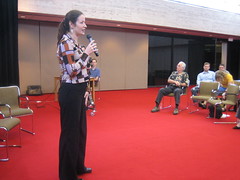 One of the WAAA2007 attendees commented at the reception dinner that everyone seemed so nice, and this was no coincidence. All the attendees were hand picked by Silona not only for their areas of experience and expertise, but also their overall friendliness and nice demeanor. Almost certainly as a result, the discussions were very respectful, and rarely was a voice raised.
One of the WAAA2007 attendees commented at the reception dinner that everyone seemed so nice, and this was no coincidence. All the attendees were hand picked by Silona not only for their areas of experience and expertise, but also their overall friendliness and nice demeanor. Almost certainly as a result, the discussions were very respectful, and rarely was a voice raised.
This conference and a few recent blog posts have underscored the importance (and frankly, efficiency) of being civil when discussing topics, developing technologies, etc. One effective method for keeping things civil is to simply not invite trolls and other negative (e.g. drama-ridden) people to your discussions. Obviously in open forums / online communities that can be more difficult, and in those you need mechanisms for swiftly identifying, banning, and otherwise filtering out negative behaviors. I've had a bunch of personal experiences with this recently which I'll write about more in a later follow-up.
Give more time and attention to nice people
For now here is my summary advice: focus most of your time on the people that are nice (or overall clear net positives), some of your time on people who are neutral (or unclear if they are net positive or negative), and no more than 1% of your time on people who are mean (or net negatives). This explicit distribution of time will likely take considerable proactive effort on your part, as once you start analyzing how much time you spend on whom, you'll likely realize that the net negatives end up soaking up most of your time (and emotional energy / attention span for that matter) by default. You will almost certainly need to take firm steps to reduce the time you spend both with such individuals, and even thinking about them, and then be sure to fill that time by both thinking about and spending time with nice people.
- View blog reactions
WAAA2007 report and overview
- created
- 8/31 11:50 PM
- content
tags:
 The We Are All Actors workshop (WAAA2007) was quite the interesting mix of individuals. In addition to contributing to the discussions as one of the invited technical experts, I learned some things about the complexities of not only the federal budget itself, but the process by which it is revised.
The We Are All Actors workshop (WAAA2007) was quite the interesting mix of individuals. In addition to contributing to the discussions as one of the invited technical experts, I learned some things about the complexities of not only the federal budget itself, but the process by which it is revised.
Apart from the scheduled subject matter, there were a number of other things I noticed worth calling out which I will briefly list here but are worthy of their own blog posts
(which I'll subsequently link to once posted).- The importance of being nice
- Demonstrating technology efficiency with real-time practice
- Inverting Assumptions
- Open discussions require open and reliable publishing
Session Format Diversity
WAAA2007 was one of the more unique conference/workshop experiences I have ever had and I think a large portion of that had to do with the wide variety of session formats over the course of the two days.
On the morning of the first day we watched both a video message from Bill Bradley on governmental transparency, and a video interview of Jimmy Wales of Wikipedia (who was interviewed by Eddie Codel) on community based solutions, pausing after each for a few minutes of open discussion which provided a very good starting pace. I found both video messages quite fascinating — each provided both high level visionary suggestions and specific design suggestions. E.g. Jimmy Wales suggested requiring login to participate in the system (without specifying how in particular, e.g. site-specific or OpenID), but not any form of required identification, that is, explicitly permit people to create and use of pseudonyms which can gain/lose reputation all on their own.
 Given the division of the workshop schedule into "Acts" I thru III, and "Actors" in the title, it didn't take much to see the pattern. In the afternoon of the first day, volunteers were tapped from the audience to play "roles" and speak to provided scripts. The scenes were clearly written to make points thru the use of story-telling thru re-enactment. A clever and certainly entertaining technique which however did leave me wondering exactly how much the scenes were based on actual anecdotes vs. crafted to represent hypothetical scenarios. My skepticism made it difficult to connect with the implied use-cases. To be fair, the authors provided disclaimers about how the scenes were merely intended to be illustrative.
Given the division of the workshop schedule into "Acts" I thru III, and "Actors" in the title, it didn't take much to see the pattern. In the afternoon of the first day, volunteers were tapped from the audience to play "roles" and speak to provided scripts. The scenes were clearly written to make points thru the use of story-telling thru re-enactment. A clever and certainly entertaining technique which however did leave me wondering exactly how much the scenes were based on actual anecdotes vs. crafted to represent hypothetical scenarios. My skepticism made it difficult to connect with the implied use-cases. To be fair, the authors provided disclaimers about how the scenes were merely intended to be illustrative.
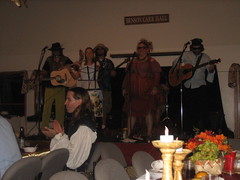 The thespian theme continued into the evening with a Shakespearian themed dinner complete with Renaissance Faire attired live music. With a belly-dancer and theremin set (separately) thrown in for good measure, which was about right for the city.
The thespian theme continued into the evening with a Shakespearian themed dinner complete with Renaissance Faire attired live music. With a belly-dancer and theremin set (separately) thrown in for good measure, which was about right for the city.
See the Group Notes from Saturday on the wiki for more details of the specific discussions / sessions.
Van Ride Conversations
Every conference has its hallway discussions. Given the relatively small size (around 50 participants I think) and fairly participatory nature of the sessions, there wasn't quite as much impetus for side discussions. There were maybe only one or two of us in the IRC backchannel at any particular point in time.
However, since many of us were from out of town and staying in the same hotel, the organizers shuttled us back and forth from the LBJ Library in a big group transport van. The rides were just long enough for those of us sitting tightly three to a row to strike up brief conversations about topics relating to the conference.
On the Sunday morning ride to the workshop, I ended up sitting next to and speaking with a gentleman from the New York Times who told me he had heard about microformats, was already interested in implementing them, and wanted me to tell him the ideas behind microformats and how microformats came about.
I told the gentleman from the New York Times that the core ideas behind microformats were about inverting several conventional assumptions, and proceeded to list the ones that came to mind.
And with that, I will expand upon the earlier points I listed, following which I'll wrap up with a summary of the final group discussions and next steps from the workshop.
- View blog reactions
We Are All Actors workshop
- created
- 8/11 8:14 AM
- content
tags:
This weekend I'm at the Lyndon Baines Johnson Library in Austin Texas participating in the We Are All Actors workshop on the Transparent Federal Budget project (TFB) with the stated goal of increasing
the transparency and accountability of our political processes
. It's a fascinating mix of people representing a good variety of perspectives and expertises: standards bearers, techies, users, data brokers, nonprofits, businesses, and role models.I'm here to contribute to the key aspects noted at the top of the We are All Actors website (emphasis mine):
Discovering and Encouraging Open Standards for our Open Source / Free Social Network
. I'm certainly going to be making sure to inform folks about the burgeoning work on social network portability. Lots of great folks here who are also helping move forward the vision of a portable social network: Brad Fitzpatrick, Dick Hardt, Joseph Smarr, and many others.Appropriately making a meta-point in the interest of transparency, the workshop organizers have setup this live Windows Media stream where you can watch our workshop on the transparent federal budget project as it happens.
Silona is now introducing the context for the workshop and has just declared that tag for the event is: waaa2007.
I'm also here in the unofficial backchannel: #waaa on irc.freenode.net.
Update: I've just created the collaborative note-taking wiki for the for workshop as well: waaa.pbwiki.com. The password (for now) is the same as the tag for the event.
- View blog reactions
5th blogiversary
- created
- 8/8 11:59 PM
- content
tags:
It feels a little surreal to have been blogging for five years. I cannot imagine what it must be like for those that have been blogging for 10+ years, like Jeffrey Zeldman, one of the original sources of inspiration that finally got me to start blogging.
This blog has survived two jobs, two long term relationships, and so far, the emergence of "Web 2.0". At the time I thought I was one of the last folks to start blogging, and yet there are probably more than 100x blogs now (>~80M) than there were then (<0.8M).
How I blog has changed dramatically since my first post five years ago.
Less News
I used to regularly read the news on Yahoo.com, actually, specifically, the most popular news in the past 24 hours (link now redirects to a generic "popular news" page, whereas it used to give you options of 24hrs, 48hrs, 7days etc.) and link to / comment on what I thought were interesting stories, as a substitute for emailing them.
At some point I realized that the vast majority of news stories were merely appealing to lowest common denominator emotional triggers and thus abandoned that particular daily habit. However, I've taken a strongly renewed interest in reducing my use of email in preference to other methods of communication.
More Web Standards
In addition to news commentary, I also wrote a little about the few things I worked on (at the time) which had a web presence, namely web standards (in particular, for advancing CSS) at the W3C, something which I continued to work on for several years after. My participation with W3C started waning after I left Microsoft (where I was an official W3C representative) in 2004 and shortly afterwards joined Technorati (where I continued contributing to W3C as an invited expert).
At Technorati I started to focus on standards for data and semantics more than style. However, I've certainly missed working with the folks in the W3C CSS Working Group (not to mention other smart folks involved with W3C) and now that I've "transitioned out of" my fulltime role at Technorati to spend more time on the microformats.org community, I'm strongly considering re-engaging with the CSS Working Group as well, if for nothing else to contribute some time to help advance some of those Candidate Recommendations (CRs) that I've worked on in the past (a few of which were CRs when I linked to them five years ago).
But first and foremost I'm focused on the microformats community, and currently the growing effort to enable portable social networks through open data formats. See the wiki for the latest and read Brian Oberkirch's excellent series of blog posts for the narrative.
What Next
Looking at the past five years, I actually find it quite difficult to predict what the next five years will bring, even the next year. I've been struggling just to keep up with the incredible growth and adoption that microformats have been experiencing, and sometimes just working out the logistics for speaking arrangements can be daunting and take forever (I know, good problems to have, to be sure). I'll be finalizing details on a few in the next couple of days so stay tuned.
Until then, go check out BarCampBlock, the 2nd anniversary of BarCamp, being planned by none other than BarCamp veterans Tara Hunt, Chris Messina, Ross Mayfield, Liz Henry, and as of a few days ago, yours truly as well. I'm excited to be working with such great people (in many cases, again), and hope you can make it.
- View blog reactions





